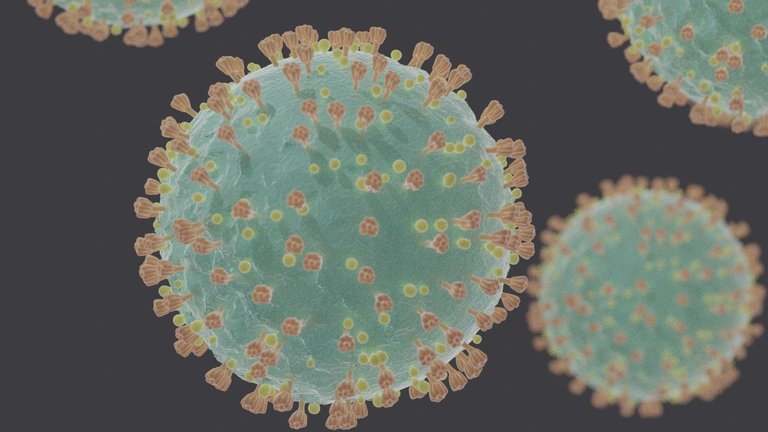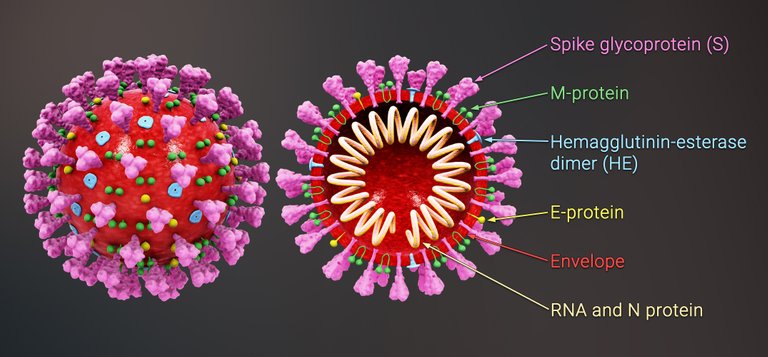Life has been difficult with covid-19 for almost all of us. Having never experienced any sort of pandemic and quarantine before we have gone through a new phase of life in the past few months.
As of today (Oct 15,2021), a total of 238,521,855 cases have been confirmed worldwide which is just huge. Out of which 4,863,818 deaths have been recorded making the case fatality rate or death rate of approximately 2-3%. (source of this data - WHO). However, the real numbers can be much higher because many asymptomatic cases might not have been recorded.
 Image By Wikipedia under CC BY-SA 4.0 license.
Image By Wikipedia under CC BY-SA 4.0 license.The severity of COVID-19 is just random. Ranging from very mild to very severe. Some people might have just flu-like symptoms lasting for few days, while some might have worsened symptoms such as pneumonia and shortness of breathing lasting for weeks after 1st symptom appeared.
Well, we now know, some people even experience a few mild to severe symptoms even after they have conquered COVID-19. In this article, we will explore what are post covid symptoms are, their severity, and ways that people can prevent them.
[Please keep in mind that, the research on post covid complications has just started].
Stages of COVID-19
Before going through the post covid complication, let's go through what are the symptoms during covid. I am sure you must have seen someone suffering from covid or you might have gone through this. Eventhough, research is still progressing on this topic. here's what we understand so far simply.
1. Asymptomatic Stage
As the name suggests, no symptoms are seen in this stage. Data suggests that this stage probably lasts for 2-3 days. We can say, this is the time when the virus multiplies itself. When you acquire the virus, most of it is stuck inside the nasal cavity where it binds to the epithelial cells and replicates itself. Nasal swabs are effective at this point however viral load can be less. These individuals might act as super spreaders or super carriers.
We still don't know the exact reason, why some people are asymptomatic, but there are some factors that can be considered. One is the environment that you grew in. This hypothesis suggests that if a person is exposed to a more diverse group of microbes from small age then it may create protection against newer pathogens. Age can be considered another factor. Most asymptomatic cases were found at the young age being 7 to 16 years old.
2. Upper airways Infection Stage
Obviously, the virus won't stop in your nasal epithelium and will migrate further to the upper respiratory tract. This leads to clinical symptoms as this stage manifests a more intense immune response. Nasal swabs at this stage will show a greater viral load. Fortunately, for about 70% of the patients, this viral load is limited to the upper airways producing only mild symptoms like cough and cold.
3. Acute Respiratory Distress Syndrome (ARDS) - Critical stage.
This is the most clinically significant stage. The main target for the Sars-Cov 2 virus is ACE2 receptors in our lungs. Well, this receptor is found in other organs too, such as the heart, kidneys, small intestine, testis, etc, but mostly in the lungs.
 Image by Wikipedia showing Structure of Sars-Cov2 Virus. Here You can see spike protein in the outermost layer which helps in endocytosis. Licensed under CC BY-SA 4.0
Image by Wikipedia showing Structure of Sars-Cov2 Virus. Here You can see spike protein in the outermost layer which helps in endocytosis. Licensed under CC BY-SA 4.0This virus attaches itself to the Angiotensin-converting Enzyme 2 (ACE2) receptor with the help of spike protein present on its outer surface. This attachment helps the virus to enter the host cells through endocytosis.
Once the virus is inside the host cell, it releases its viral content into the cell. Which uses the host cell for its replication, transcription, and translation(viral protein synthesis).
ACE2 receptors are mostly present in TYPE 2 Pneumocytes in the alveolar cells in the lungs. The main function of this cell is to produce surfactant that gives the lungs its elasticity. Viral replication damages these cells. This triggers the production of proinflammatory cytokines leading to the activation of the innate immune system. Innate immune system simply means the immunity that you were born with.

Image by [Wikipedia](https://commons.wikimedia.org/wiki/File:Viral_entry_(Endocytosis_and_lysis).svg) showing Viral entry into the cell by Endocytosis. Licensed under [CC BY-SA 3.0](https://creativecommons.org/licenses/by-sa/3.0/deed.en)
Damages and inflammation of the alveoli are already done by this point which will create breathing difficulties and cough reflexes. This stage is simply known as Pneumonia.
As the viral load increases more immune cells are needed to fight back. This leads to a problem. I mentioned earlier proinflammatory cytokines are released during alveolar damage. These Cytokines call for more help. They open up the blood vessels to recruit new immune cells faster but in turn increase the vascular permeability.
This is a serious problem because leakage of fluid also occurs in the lungs leading to pulmonary Edema. Also, there will be no elasticity in the lungs as surfactant production is altered. Alveolar collapse is a possibility at this stage.
The combined effects of Alveolar cell damage, its inflammation, collapse, and collection of fluids due to increased vascular permeability leads to minimum gaseous exchange in the lungs which can be said as Acute respiratory distress syndrome or ARDS. This is the Life-threatening condition in Covid -19
Symptoms During Covid-19
| Most Common | Less Common | Life Threatning |
|---|---|---|
| Fever | Headache | Shortness of breathing |
| Cough | Sore throat | Loss of speech |
| Tiredness | Body Pain | Chest Pain |
| Lost of taste and smell | Diarrhoea | Confusion |
The Long Term Effects
We are now more than a year into the Covid and have finally begun to understand its long-term effects. Many people have reported various symptoms still persisting even after conquering covid. This phase of prolonged symptoms even after being Covid negative is called "Long Covid". The patients are called "Long Haulers".
Data suggests that long-term complications are very common. Unlike other severe post covid complications that only persisted in severe cases, these symptoms can happen in any covid patient, even if the severity was mild or asymptomatic before.
The long-term symptoms may last over 14 weeks of diagnosis.
Weakness and Tiredness are found to be the most common long-term symptoms lasting up to 12 weeks after covid.
Similarly, most of the patients with respiratory issues such as shortness of breath continued having those symptoms even after recovery.
More than 60% of patients have reported persistent cough and some degree of chest pain even after 12 weeks of diagnosis.
Also more than 60% of discharged ICU patients showed some sort of cardiopulmonary pathology even after 3-4 months of discharge.
Other long term Complications
- Mobility Issues
- Some degree of memory loss
- Tremors
- Headache
- Taste and smell loss
- Diarrhea
- Sleep problems
- Dizziness
- Rashes
- Mood changes
- Muscle Pain and Joints pain
Effect on Multiple Organs at once
This effect is not very common. But it's a serious situation. A previous covid patient with a very serious illness might go through this condition. Over a longer period of time, an autoimmune reaction can occur targeting multiple organs at once. Not just organs but the autoimmune reaction can trigger the whole body at once, including the organs like lungs, kidney, heart, etc.
An autoimmune reaction is a condition when a patient's own immune system attacks the healthy organs in response to some trigger or from some unknown cause.
Some Children might experience Multisystem Inflammatory syndrome(MIS) which is even more severe.
Post Covid Care
Anyone, who has got covid before, must be aware of these long-term symptoms and go for regular check-ups. Keep in mind that even if the patient is covid negative now, the long-term complication has the potential for organ damage.
Post-coivd patients should go for regular weekly follow up and a chest x-ray every 2-3 month if any of the respiratory symptoms is still persistent. Also, keeping an oximeter is a good idea for remote monitoring.
Focusing on a nutritious diet and exercising daily will obviously lead you to better results faster. Try to get plenty of sleep.
Also, Mental health must not be ignored. And one must seek professional help if needed.
That's it for this article guys, Hope you liked it.
**All Images used are copyright free**
Previous Article
Refrences:
[1]. https://www.worldometers.info/coronavirus/?
[2]. https://www.cdc.gov/coronavirus/2019-ncov/your-health/treatments-for-severe-illness.html
[3]. https://www.who.int/news/item/27-04-2020-who-timeline---covid-19
[4]. https://en.wikipedia.org/wiki/COVID-19
[5]. https://health.ucdavis.edu/coronavirus/covid-19-information/covid-19-long-haulers.html
[6]. https://erj.ersjournals.com/content/55/4/2000607
very informative .. thanks doc ! ;)
glad you liked it ;)
Welcome back to the community. it's been a while. And thanks for this comprehensive piece on covid. Would be interesting to see the percentage of victims that suffer from autoimmune reactions after recovery. I have heard some things along that line but never seen anything concrete on it.
Thank you Gentleshaid. Finally back on Hive :)
The worldwide research on autoimmunity after covid is still ongoing and it's unclear for large demographic. but a study conducted on 147 covid patients and 48 normal individuals showed that more than 50% of covid patients showed at least one type of autoimmune antibody circulating. In contrast to the normal individuals, it was only 15%. Also, more than 20% of these covid patients developed newer autoantibodies after when the disease progressed.
Source: https://www.news-medical.net/news/20210914/Severe-COVID-19-linked-to-increase-in-autoantibodies.aspx
In Nigeria where I work, many of these post COVID symptoms seem to be masked and even more difficult to pin-point more often than not.
Symptoms of COVID and Post COVID have many times presented like malaria, which is endemic here.
But in a country where over-the-counter medications are quite common and patients have differing opinions about their health, there's so much in the mix to accurately determine what is COVID-related and not.
yup! same problem in my country too .. people are just not aware about post covid symptoms and tend to mix it with other diseases.. In my opinion . a proper covid antibody screening is needed to get an idea if the symptoms might be related to post covid.
Congratulations @idoctor! You have completed the following achievement on the Hive blockchain and have been rewarded with new badge(s) :
Your next target is to reach 200 comments.
You can view your badges on your board and compare yourself to others in the Ranking
If you no longer want to receive notifications, reply to this comment with the word
STOPTo support your work, I also upvoted your post!
Thanks for your contribution to the STEMsocial community. Feel free to join us on discord to get to know the rest of us!
Please consider supporting our funding proposal, approving our witness (@stem.witness) or delegating to the @stemsocial account (for some ROI).
Please consider using the STEMsocial app
app and including @stemsocial as a beneficiary to get a stronger support.